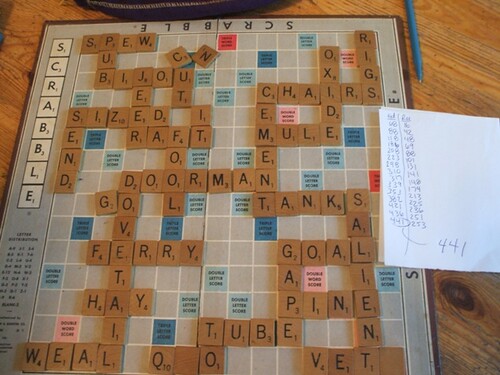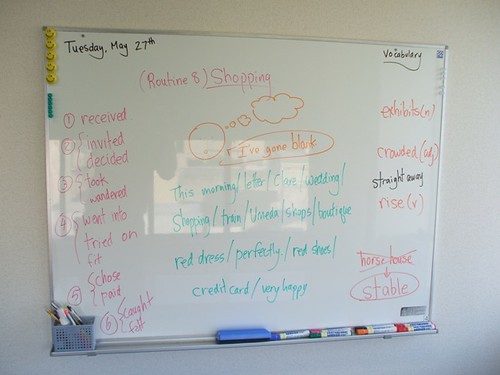スミス英会話大津の日本語のサイトはここです。
Keen and creative students can both impress and inspire. As well as teaching students new things about the English language and coaching them to become confident using English, part of our job is to help our students learn how to study. Our students come from a variety of backgrounds- some are in public school now, others recently graduated, some are in university, and many graduated from traditional learning a long time ago. Not to mention tht few of them have ever studied or taken notes in English before. So a few bits of advice on note taking can help our students. I don’t claim to be the best note taker, so I let my students inspire each other and share their ideas.
To do this, I use one of my favourite lessons, “Giving Advice“. After teaching the students how to use the lesson language and doing some “textbook” practice, I have them individually make a list of their weakpoints in English, for example grammar, spelling, pronunciation, vocabulary, and so on. Then I set them up to tell each other their weak points and have the other student(s) offer their advice on how to improve in that area. Students takes to this well and usually have many great ideas to share about all aspects of English learning. Often, their advice revolves around the topic of note taking.

Here are some wonderful ideas students have come up with for note taking and studying in general (paraphrased):
*”I like to record the lesson and then I listen to it while relaxing in the evening or while I am studying”
*”I like to record the lesson and then I listen to it afterwards and fill in my notes. This way I can focus more on communicating during the lesson, but I don’t miss any key points because they are recorded for later. I usually takes notes in class in pencil, and fill in later from the recording in pen”
*”I like to take notes using various colours of pens and highlighters, which helps me to organize new vocabulary into nouns, adjectives, verbs, and so on”
*”I always go through my notes between classes and type them up. The next lesson I go early and go over them with the teacher so I can check my mistakes, then I edit them at home. This way it’s really easy to have an organized set of notes”
*”I use several different English learning websites to learn many new things. I am always happy to share these websites with my classmates. Currently 3 of us are all trying the same games on one website. We like trying the games and we email each other with help”
Lots of great ideas that students are eager to share. Their eagerness is what makes this lesson so great- they are keen to share their ideas, and this really gets the tongues wagging. Sharing is a great way to learn, especially such useful ideas as these. Alex Stanciu from SSE Fuse and Al Bartle from SSE Okamoto also have some great tips for students. Click HERE for Alex’s Website Advice and HERE for Al’s advice.

Here are some more great tips for TEACHERS:
*Teach your students how to take abbreviated notes, such as the way you took notes in university. Teach them how to abbreviate common words and then go through their notes later and reqrite everything in full.
*Encourage students to have an area in their notebook for new vocabulary, so that it’s easy to study and remember later on.
*Drawing pictures will help them to remember new vocabulary. Image association is a very useful tool.
*After class, students can go through there notes and group new words into categories.
*A fun exercise is to pick a topic and part of speech and have students brainstorm as much vocabulary as they can about that topic, drawing a word web in their notebook.
And here’s some more great advice for STUDENTS (from students):
*Spend 15 minutes every day doing something English: watch a movie or the news, read a book or an English newspaper, listen to your favourite English CD. Anything to help your brain to think in English. Adrian from SSE Hirakata has some great advice about the effectiveness of TV for learning languages HERE.
*English board games can be a fun way to improve your vocabulary and make you think in English. Some recommended games are: boggle, scrabble, crossword, word search, and jumble. Many of these games are available online, or your teacher may have some at the school.
*Between lessons, copy ALL your notes, either into a different [clean] notebook or onto the computer.
*Writing out your notes on the computer will help you with spelling and major grammar mistakes.
*If you are a slow note taker, try taking a camera to class and take snapshots of the whiteboard throughout the lesson. Read Martin’s post about this method HERE.

So teachers, remember that a small part of your job is helping students learn how to study. Also note that students are keen to share their ideas about how to study, so let them share their ideas. Try using the “Giving Advice” lesson to give them the tools they need to give each other helpful study tips. A few tips from you MAY work, but advice from peers will go a lot farther as it carries empathy and energy.
Edward, SSE Ohtsu
エドワード、スミス英会話大津
Excellent post Edward. Thank you. jim
Great post. Very informative and I hope that people take the time to read the other teacher’s posts on how to get the most out of their classes. T.E.A.M. (Together Everyone Achieves More).
I am also a big believer in using technology to aid our studies which is why I made a CD a few years ago for students which focuses on the routines. If you’re curious just let me know.
Computers are also the way to go when it comes to keeping records, I am working on a database to allow me to keep track of all my classes as well as my students. It’s getting close to being finished my team is just working out the bugs. Should be ready within the next few weeks.
Thanx for the comments. Adrian- I am very interested in the new resources you are creating and look forward to seeing and using them soon. We at Ohtsu are also working on some revised lesson plans and new resources for the idiom and phrase lessons. Keep up the good work and I’m looking forward to seeing some new stuff!
Edward
Edward,
Thanks for this great post! I especially like the tips from students on how to study English. It reminds me that this is something I need to do with my students. They often ask me what to do but they are most likely thinking about it themselves and may have some unique ideas that their fellow students could benefit from knowing.
Al